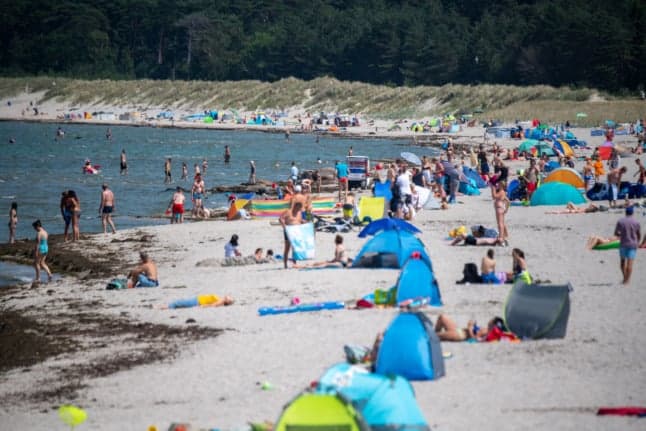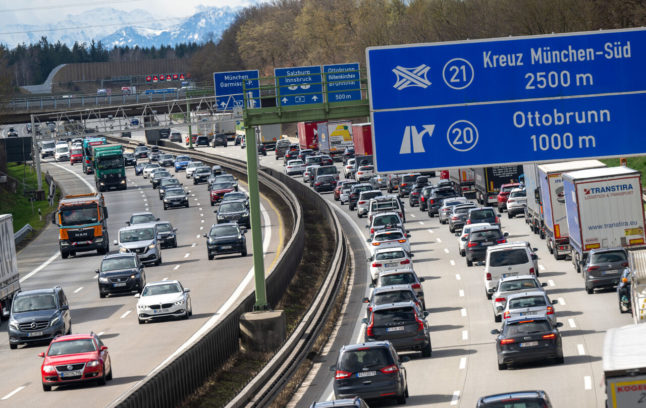Everything that changes in Germany in August 2023

From holiday closures to new professions being recognised, here are the biggest dates, deadlines and legal changes coming to Germany in August.
Germany may not be seeing as many big changes to laws as it did in July, but there’s still a slew of upcoming holidays and deadlines to take note of.
And if you work in a few specific fields - or aspire to - you can look forward to higher wages and more recognition.
Public holidays and lucky Bavarians
Bavaria is known as being the German state with the most public holidays, and it doesn't shy away from its reputation in August. On Tuesday, August 15th, the southern state (as well as the small state of Saarland in western Germany) gets a Feiertag for the Catholic holiday of Mariä Himmelfahrt.
You can count yourself particularly lucky if you live in the Bavarian city of Augsburg: on Tuesday, August 8th, residents also get the day off for the Hohes Friedensfest, a celebration of religious freedom which has been taking place nearly every year since 1650.
READ ALSO: When are Germany's state and national public holidays in 2023?

Cars and lorries drive on the A99 motorway at the Munich South motorway junction.in April 2023. Such traffic jams occur often at the start of holiday seasons. Photo: picture alliance/dpa | Peter Kneffel
Many, sometimes unpredictable closures
Even if you don’t live in Bavaria and, alas, are working every day during the month of August, you’ll notice that a lot of other people aren’t. At your favourite restaurant, or even smaller offices, you can expect to see signs hung in front with an announcement like “Wegen Urlaub geschlossen” (closed due to holidays), often for the entire month and sometimes even stretching into September.
So even if Google tells you that a business is open, be sure to call in advance - many places also simply close their doors early each day of the month or take a Hitzefrei break if temperatures rise too high.
READ ALSO: Hitzefrei: Is it ever legally too hot to go to work or school in Germany?
Fluorescent tubes and lamps will be banned
Last year, the EU Commission already regulated that certain illuminants are no longer allowed to be produced.
Starting on Tuesday, August 1st, fluorescent tubes will be taken off the market completely.
And from August 25th, T8 and T5 fluorescent lamps will neither be sold nor produced. A few days later in September, halogen pins will also be banned. The rationale behind the bans is the mercury used in the bulbs, which can be dangerous for the environment as well as for humans.
Subsidy guidelines for plug-in hybrids will change
Anyone who purchases a plug-in hybrid has been able to receive a subsidy from the German government. But starting on August 1st, new guidelines stipulate that the rebate is only available for cars which have a minimum electric range of 80 kilometres.
Company cars will only be subsidised if it can be proven that more than half of the distances travelled are powered by electricity. Yet it’s still unclear how exactly this can be proven.
Tax return for 2021 must be submitted
Don't worry if you still haven't submitted your 2021 tax return, because you might have a little more time left on your hands. August 31st is the deadline for German residents who work with a tax consultancy, a wage tax assistance association or other authorised persons.
By this date, you'll need to have submitted your forms only, or at least have sent a message to the clerk at the local tax office.
READ ALSO: New deadlines and deductions: How to file taxes in Germany in 2023
New Kitajahr begins
Many daycares (Kitas) only accept new children once a year. This is because many of the older children switch to school after the holidays, which frees up a lot of places. Notification letters asking for contributions and payments for meal allowances - which differ state to state - were usually already sent out in July.
READ ALSO: It's not impossible: How I found a good Kitaplatz in Germany

Children play a colouring game at a German Kita. Photo: picture alliance / dpa | Jens Büttner
New apprenticeship profession introduced
In many countries, a university degree is the most sure-fire way to enter into a profession. But the German ‘Ausbildung’ system allows aspiring workers - including those who hail from another country - to gain hands-on experience in a company while also receiving training at an official institute.
For the training to be recognised, however, it has to belong to a list of official professions. Starting on August 1st, Germany is getting up to speed with the times and adding another Ausbildung to the ranks: immersive media designer, or Gestalter für immersive Medien.
That would be a person who designs environments for users that are computer-generated or enriched with virtual information. They might design VR glasses, or an ‘augmented reality app’ that can be used with a phone camera.
READ ALSO: EXPLAINED: How to boost your career chances in Germany
Higher minimum wage in one field
They are often part of gangster films and usually don’t get the better end of the deal: people who work in money and valuables transport. Since employees in this line of work bear a lot of responsibility and are also exposed to risks, they receive a higher minimum wage than other transporters.
Employees working in Germany's most populous state of North Rhine-Westphalia can expect to see a minimum wage increase, or €20.64 rather than €20 starting on August 1st.
Increased remuneration for this training occupation
From August 1st, the training allowance for trainees in the painting and varnishing trade will be adjusted. In the first year of their Ausbildung, the remuneration is increased to €770, in the second year of training to €850 and in the third and final year of training to €1,015, according to the Deutsche Handwerks Zeitung.
Calling all Women’s World Cup fans
The 2023 Women's World Cup in Australia and New Zealand kicked off on July 20th but will run until August 20th. German public broadcasters ARD & ZDF and the European Broadcasting Union (EBU) were able to reach an agreement with the world governing body FIFA at the last minute to stream all 64 matches.
READ ALSO: How you can watch the Women's World Cup in Germany
Comments
See Also
Germany may not be seeing as many big changes to laws as it did in July, but there’s still a slew of upcoming holidays and deadlines to take note of.
And if you work in a few specific fields - or aspire to - you can look forward to higher wages and more recognition.
Public holidays and lucky Bavarians
Bavaria is known as being the German state with the most public holidays, and it doesn't shy away from its reputation in August. On Tuesday, August 15th, the southern state (as well as the small state of Saarland in western Germany) gets a Feiertag for the Catholic holiday of Mariä Himmelfahrt.
You can count yourself particularly lucky if you live in the Bavarian city of Augsburg: on Tuesday, August 8th, residents also get the day off for the Hohes Friedensfest, a celebration of religious freedom which has been taking place nearly every year since 1650.
READ ALSO: When are Germany's state and national public holidays in 2023?

Many, sometimes unpredictable closures
Even if you don’t live in Bavaria and, alas, are working every day during the month of August, you’ll notice that a lot of other people aren’t. At your favourite restaurant, or even smaller offices, you can expect to see signs hung in front with an announcement like “Wegen Urlaub geschlossen” (closed due to holidays), often for the entire month and sometimes even stretching into September.
So even if Google tells you that a business is open, be sure to call in advance - many places also simply close their doors early each day of the month or take a Hitzefrei break if temperatures rise too high.
READ ALSO: Hitzefrei: Is it ever legally too hot to go to work or school in Germany?
Fluorescent tubes and lamps will be banned
Last year, the EU Commission already regulated that certain illuminants are no longer allowed to be produced.
Starting on Tuesday, August 1st, fluorescent tubes will be taken off the market completely.
And from August 25th, T8 and T5 fluorescent lamps will neither be sold nor produced. A few days later in September, halogen pins will also be banned. The rationale behind the bans is the mercury used in the bulbs, which can be dangerous for the environment as well as for humans.
Subsidy guidelines for plug-in hybrids will change
Anyone who purchases a plug-in hybrid has been able to receive a subsidy from the German government. But starting on August 1st, new guidelines stipulate that the rebate is only available for cars which have a minimum electric range of 80 kilometres.
Company cars will only be subsidised if it can be proven that more than half of the distances travelled are powered by electricity. Yet it’s still unclear how exactly this can be proven.
Tax return for 2021 must be submitted
Don't worry if you still haven't submitted your 2021 tax return, because you might have a little more time left on your hands. August 31st is the deadline for German residents who work with a tax consultancy, a wage tax assistance association or other authorised persons.
By this date, you'll need to have submitted your forms only, or at least have sent a message to the clerk at the local tax office.
READ ALSO: New deadlines and deductions: How to file taxes in Germany in 2023
New Kitajahr begins
Many daycares (Kitas) only accept new children once a year. This is because many of the older children switch to school after the holidays, which frees up a lot of places. Notification letters asking for contributions and payments for meal allowances - which differ state to state - were usually already sent out in July.
READ ALSO: It's not impossible: How I found a good Kitaplatz in Germany

New apprenticeship profession introduced
In many countries, a university degree is the most sure-fire way to enter into a profession. But the German ‘Ausbildung’ system allows aspiring workers - including those who hail from another country - to gain hands-on experience in a company while also receiving training at an official institute.
For the training to be recognised, however, it has to belong to a list of official professions. Starting on August 1st, Germany is getting up to speed with the times and adding another Ausbildung to the ranks: immersive media designer, or Gestalter für immersive Medien.
That would be a person who designs environments for users that are computer-generated or enriched with virtual information. They might design VR glasses, or an ‘augmented reality app’ that can be used with a phone camera.
READ ALSO: EXPLAINED: How to boost your career chances in Germany
Higher minimum wage in one field
They are often part of gangster films and usually don’t get the better end of the deal: people who work in money and valuables transport. Since employees in this line of work bear a lot of responsibility and are also exposed to risks, they receive a higher minimum wage than other transporters.
Employees working in Germany's most populous state of North Rhine-Westphalia can expect to see a minimum wage increase, or €20.64 rather than €20 starting on August 1st.
Increased remuneration for this training occupation
From August 1st, the training allowance for trainees in the painting and varnishing trade will be adjusted. In the first year of their Ausbildung, the remuneration is increased to €770, in the second year of training to €850 and in the third and final year of training to €1,015, according to the Deutsche Handwerks Zeitung.
Calling all Women’s World Cup fans
The 2023 Women's World Cup in Australia and New Zealand kicked off on July 20th but will run until August 20th. German public broadcasters ARD & ZDF and the European Broadcasting Union (EBU) were able to reach an agreement with the world governing body FIFA at the last minute to stream all 64 matches.
READ ALSO: How you can watch the Women's World Cup in Germany
Join the conversation in our comments section below. Share your own views and experience and if you have a question or suggestion for our journalists then email us at [email protected].
Please keep comments civil, constructive and on topic – and make sure to read our terms of use before getting involved.
Please log in here to leave a comment.